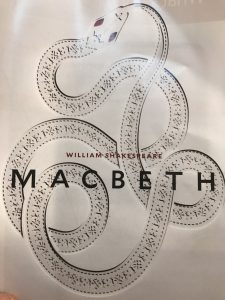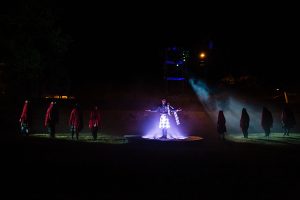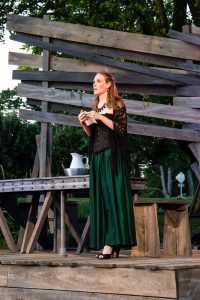 Before last night’s terrific production of Macbeth by Shakespeare on the Sound in Rowaytan, CT, my students and I had a great chat with Claire Kelly, who directed this show, and with Emily Bryan, who prepared the script for performance (and who I’ve known for some time in academic Shakespeare circles).
Before last night’s terrific production of Macbeth by Shakespeare on the Sound in Rowaytan, CT, my students and I had a great chat with Claire Kelly, who directed this show, and with Emily Bryan, who prepared the script for performance (and who I’ve known for some time in academic Shakespeare circles).
Claire observed something about the Weird Sisters that I’ve noticed also — the first Witch speaks about the past, the second about the present, the third about the future — and she used that insight to structure her casting, with the first sister played by the adult Jessica van Neil, the second by twenty-something Meghan Grover, and the third, with dazzling energy, by twelve-year old Beatrice Shannon. With that prompt, I re-heard all the language about time and simultaneity in the play, from Macbeth’s urge to “jump the life to come” (1.7.7) to the urgent futurity of Lady Macbeth’s “all-hail hereafter” (1.5.55) to the resonant glories of “Tomorrow and tomorrow and tomorrow” (5.5.16-27). It’s not a new thought to say that the polytemporal Sisters and the Macbeth’s ambition drive the play’s headlong reckless pace. But it felt urgent and all around me last night.
Another great pleasure of this outdoor production was the fractured set. Pinkney Park, a small green space by a salt-water estuary a few hundred yards from Long Island Sound, is a natural depression. The stage spread around the space in many parts: a central circle like a well, a banquet table, witches’s heath, and battlefield, not to mention several scenes that were played among audience members on beach blankets and folding chairs. With help from Emily Bryan, our group reserved a blanket down at the center, which meant a lot of turning and neck-craning to locate scene changes, but also a wonderful feeling of being at the center of things.
The distributed set did in space what Shakespeare’s language does in time and Kelly’s casting did with the Sisters: it made everything present simultaneously, rejecting lineal progression in favor of multiple points of access. Even the vision of Banquo’s line of kings, “stretch[ing] out to th’ crack of doom” (4.3.116) stretched both ways, radiating out in two directions from the centrally-placed Banquo, played with wonderful charisma by Calvin Smith.
Sound too encircled us: in place of a musical score, the disembodied voices of the Sisters echoed chorus-like over the audio system during scenes and transitions. Solitary words swirled out of fog-machine fog: “Macbeth…Treason…Murder…Macbeth.”
Of the performances, my favorite was Winsome Brown as a daring and pleasure-loving Lady Macbeth. Prompted by my thinking about time and simultaneity in the play, I heard in her reading of her husband’s letter (1.5.1.1-30) an abrupt embrace of the play’s headlong rush toward dark futures: “Glamis thou art, and Cawdor, and shalt be / What thou art promised” (1.5.15-16). When she fears his “milk of human kindness” (1.5.17) she’s anticipating her husband’s dilatory nature, the slow thickness of his reasoning and his poetic languors. Her world is faster and more eager. To set up the “unsex me here” soliloquy, Brown walked slowly down to the well at the center of the stage area. She paced around the well’s circular edge, slowly pouring the dregs of her glass of red wine into the grass a few feet from my Birkenstock’d toes. Then she stood at the center of the circle and addressed the sky. “Come you spirits / That tend on mortal thoughts…” (1.5..40-41) It’s hard to perform these familiar lines distinctly, but Brown soared them last night.
I’ve seen a few recent productions that emphasize the passion in the marriage, but I’ve seldom seen a Lady Macbeth show herself more bereft at her husband’s withdrawal in the second half of the play. The final lines of her mad hand-washing speech, which were also her final lines in the play — ”To bed, to bed, to bed” (5.1.67) — voiced marital solitude and alienation.
Graham Stevens was as likeable and persuasive as one might ask a Macbeth to be — perhaps even too sympathetic for a tyrant and killer. His measured delivery emphasized how much of his spoken part poses doubts, anxieties, a troubled conscience. “He’s here in double trust” (1.7.12) Stevens explained. We don’t see him perform kill his king, though we watch him wash clean his “hangman’s hands” (2.2.28), “I have done the deed” (2.2.15), he reports to his wife. But we never see him at it.
The rest of the cast was strong and compelling, especially Lucy van Atta as Lady Macduff and the compellingly quadruple-cast John Hardin (also of the awesome Adirondack Shakespeare Company), who developed a bitter and funny through-line as Porter, Old Man, First Murderer, and Doctor. Nicholas Urda brought enough taught violence to the part of Macduff that I wondered what he would’ve done in the title role.
My students and I came to the production prepped by our online summer class in “Tyranny,” having read Timothy Snyder’s On Tyranny, Milton’s Paradise Lost, and the 16c Huguenot resistance tract Vindiciae contra tyrannos alongside Macbeth. We’ve been having intense and often Trump-y conversations about how literary culture represents tyranny, resistance, and political catastrophe. This production avoided flash points and has not been harassed by Breitbart-reading trolls. But it left me thinking about how seductive the rush to violent change can be. Even with supernatural accomplices, tyranny looked very human on this outdoor stage. As Macbeth says to the phantom dagger, “Thou marshell’st me the way that I was going, / And such an instrument I was to use” (2.1.42-43).
Go see it before it closes July 2!




Steve, thanks so much for your thoughts on the production!! It is wonderful to hear your insights, especially in light of your class!!